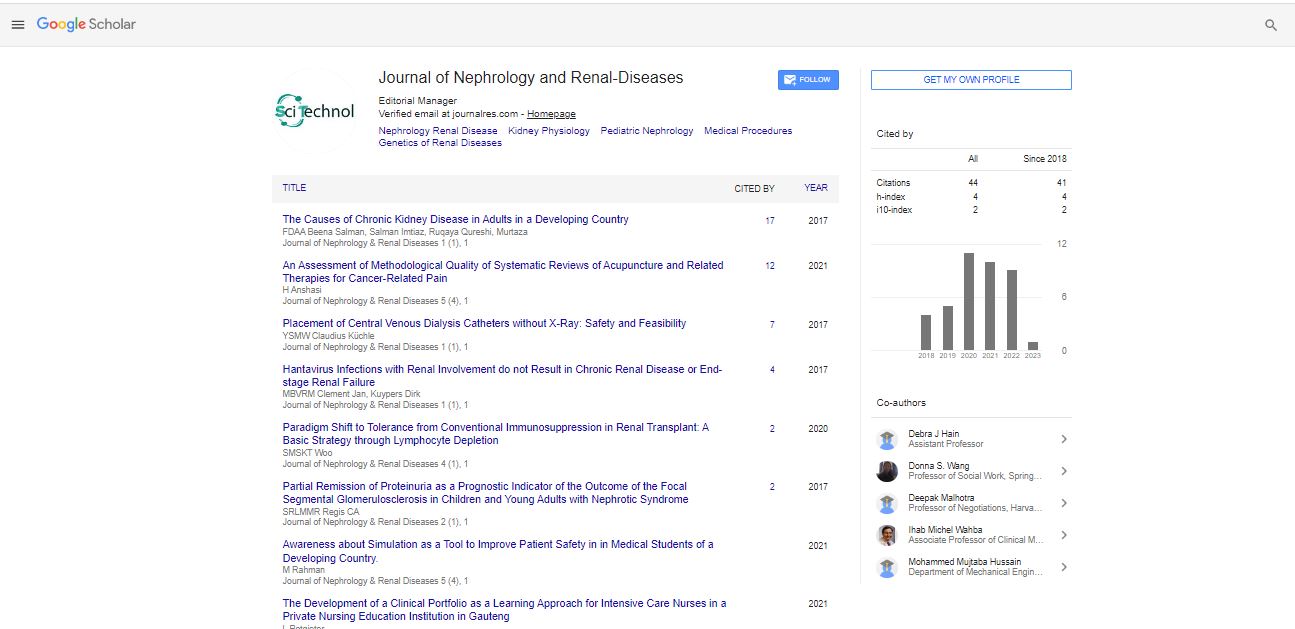Opinion Article, J Nephrol Ren Dis Vol: 7 Issue: 4
Exploring the Advancements and Innovations in Renal Medicine
Kontamaria Goldschitmed*
1Department of Pathology, University Medical Center Utrecht, Utrecht, the Netherlands
*Corresponding Author: Kontamaria Goldschitmed,
Department of Pathology,
University Medical Center Utrecht, Utrecht, the Netherlands
E-mail: kg.maria@umcutrecht.nl
Received date: 01 November, 2023, Manuscript No. JNRD-23-123921;
Editor assigned date: 03 November, 2023, PreQC No. JNRD-23-123921 (PQ);
Reviewed date: 20 November, 2023, QC No. JNRD-23-123921;
Revised date: 27 November, 2023, Manuscript No. JNRD-23-123921 (R);
Published date: 04 December, 2023, DOI: 10.4172/2576-3962.1000052
Citation: Goldschitmed K (2023) Exploring the Advancements and Innovations in Renal Medicine. J Nephrol Ren Dis 7:4.
Abstract
Renal medicine, a specialized field within the broader realm of nephrology, encompasses the diagnosis, treatment, and management of various kidney-related conditions. The kidneys, vital organs responsible for filtering blood, maintaining electrolyte balance, and eliminating waste, play a pivotal role in overall health. In recent years, the field of renal medicine has witnessed significant advancements, from innovative diagnostic tools to novel therapeutic interventions.
Description
Renal medicine, a specialized field within the broader realm of nephrology, encompasses the diagnosis, treatment, and management of various kidney-related conditions. The kidneys, vital organs responsible for filtering blood, maintaining electrolyte balance, and eliminating waste, play a pivotal role in overall health. In recent years, the field of renal medicine has witnessed significant advancements, from innovative diagnostic tools to novel therapeutic interventions. This article explores the key developments in renal medicine, shedding light on how these advancements are reshaping the landscape of kidney care.
Precision diagnostics
Precision diagnostics have become a cornerstone of renal medicine, allowing for the early detection of kidney disorders. Biomarkers, such as serum creatinine and cystatin C, provide valuable insights into renal function. Additionally, novel biomarkers are being explored for their potential in identifying kidney damage at earlier stages, enabling prompt intervention and improved outcomes. Imaging technologies have undergone substantial improvements, enhancing the ability to visualize kidney structure and function. Advanced imaging modalities, including Magnetic Resonance Imaging (MRI) and Computed Tomography (CT) scans, provide detailed anatomical information, aiding in the diagnosis and monitoring of kidney diseases.
Therapeutic innovations
Glomerular diseases, affecting the kidney's filtration units, have seen therapeutic advancements with the introduction of immunotherapies. Monoclonal antibodies and targeted therapies are being explored to modulate the immune response and mitigate the inflammatory processes underlying conditions like glomerulonephritis. Hypertension and diabetic nephropathy, leading causes of Chronic Kidney Disease (CKD), are benefiting from the advent of precision medications. Drugs targeting specific pathways involved in blood pressure regulation and glucose metabolism offer tailored approaches for managing these conditions and preventing progression to advanced kidney disease.
Renal replacement therapies
Dialysis, a life-sustaining therapy for individuals with End-Stage Renal Disease (ESRD), has witnessed technological advancements. High-efficiency dialyzers, wearable and portable dialysis devices, and improved hemodialysis techniques contribute to enhanced efficiency, patient comfort, and overall treatment outcomes. The frontier of renal replacement therapies extends to bio artificial kidneys and organ engineering. Researchers are exploring the development of bioengineered kidneys that mimic natural kidney functions. These groundbreaking approaches hold the potential to revolutionize the landscape of renal replacement therapy in the future.
Personalized medicine in kidney transplantation
Kidney transplantation, a definitive treatment for ESRD, benefits from personalized medicine approaches. Tailoring immunosuppressive regimens based on individual patient profiles and immune system characteristics helps optimize graft survival while minimizing the risk of rejection and complications. Genomic matching in kidney transplantation has gained prominence. Analyzing genetic compatibility between donors and recipients allows for more precise organ allocation, reducing the likelihood of rejection and enhancing the long-term success of kidney transplants. The integration of telemedicine and remote monitoring has brought about patient-centric care in renal medicine. Remote consultations, virtual follow-ups, and continuous monitoring of vital parameters enable healthcare providers to maintain close connections with patients, improving accessibility and adherence to treatment plans. Renal medicine has increasingly emphasized patient education and empowerment. Educational initiatives empower individuals with kidney conditions to actively participate in their care, make informed decisions, and adopt lifestyle modifications that positively impact kidney health.
Conclusion
Advancements in renal medicine are reshaping the landscape of kidney care, offering new avenues for diagnosis, treatment, and patient management. From precision diagnostics and therapeutic innovations to personalized medicine approaches and patient-centric care, these developments underscore a commitment to enhancing outcomes and quality of life for individuals affected by kidney disorders. As research and technology continue to evolve, the future holds promise for further breakthroughs, ultimately transforming the field of renal medicine and improving the lives of countless individuals with kidney-related conditions.
 Spanish
Spanish  Chinese
Chinese  Russian
Russian  German
German  French
French  Japanese
Japanese  Portuguese
Portuguese  Hindi
Hindi 
